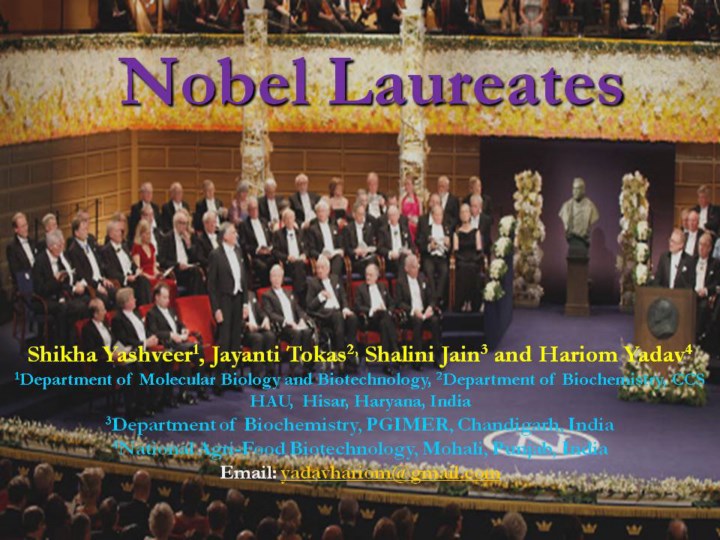| front |1 |2 |3 |4 |5 |6 |7
|8 |9 |10 |11 |12 |13 |14 |15 |16 |17 |18 |19 |20 |21 |22 |23 |24 |25 |26 |27 |28 |29 |30 |31 |32 |33 |34 |35 |36 |37 |38 |39 |40 |41 |42 |43 |44 |45 |46 |47 |48 |49 |50 |51 |52 |53 |54 |55 |56 |57 |58 |59 |60
|61 |62 |63 |64 |65 |66 |67 |68 |review
|
 |
Nobel Laureates lecture by Shikha Yashveer,
Jayanti Tokas, Shalini Jain and Hariom Yadav Uploading date: July 26, 2013 Nobel Prize Laureates Supercourse Lectures http://www.pitt.edu/~super1/collections/collection7.htmNobel Prize Awarded annually by the Royal Swedish Academy of Sciences, the Swedish Academy, the Karolinska Institute, and the Norwegian Nobel Committee to individuals and organizations who make outstanding contributions in the fields of chemistry, physics, literature, peace, and physiology and medicine.
The Nobel Memorial Prize in Economic Sciences, was established in 1968 by the Sveriges Riksbank, the central bank of Sweden, for contributors to the field of economics.
The Royal Swedish Academy of Sciences awards the Prizes in Physics, Chemistry, and Economics, the Karolinska Institute awards the Prize in Physiology and Medicine, and the Norwegian Nobel Committee awards the Prize in Peace.
Prizes can only be awarded to individuals, except the Peace Prize.
Each award can be given to a maximum of three people per year.
First awarded in 1901, five years after Alfred Nobel's death.
If there are multiple winners of one subject, the award money is split equally among the winners.
Each year there are 100 to 250 nominees for each prize.
If someone nominated himself/herself, he/she would automatically be disqualified.
Someone cannot be nominated posthumously. Yet, if someone was alive when nominated but died before the award was given, they may be awarded posthumously.
Prizes must be awarded at least once every 5-year period. |
Search for more Supercourse Lectures